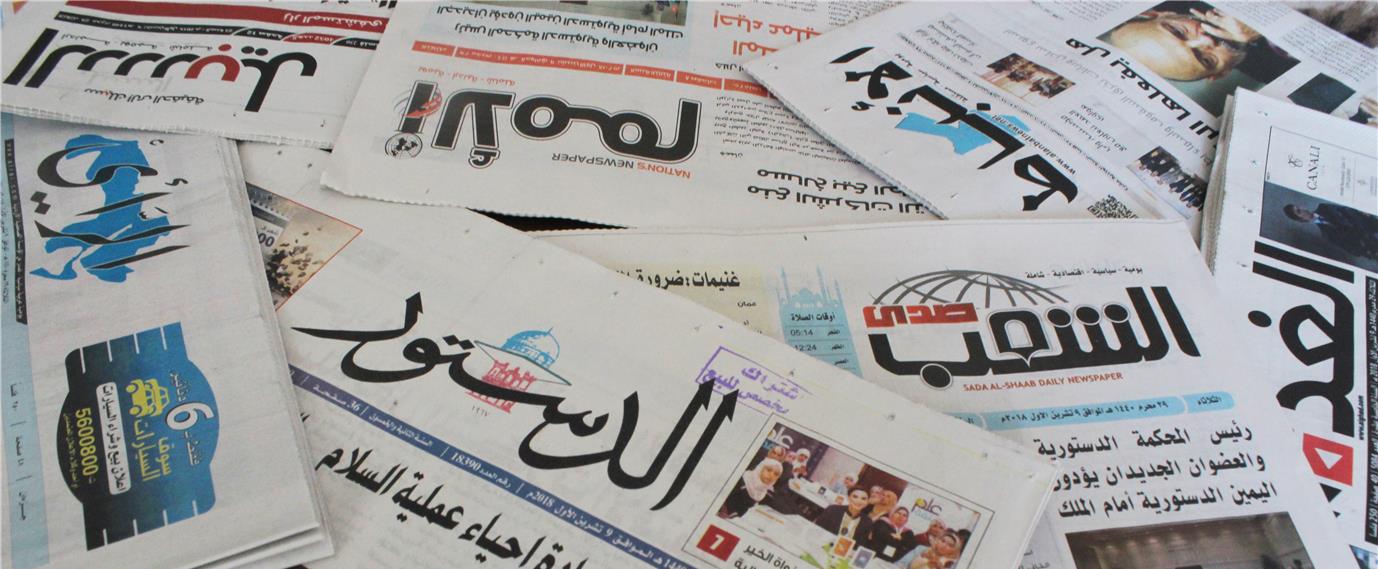منذ زمنٍ، يُقاس بالسنوات التي لا أعرف عددها، لم أقرأ صحيفةً من ورقٍ. لكن، مدفوعًا بتقصيّ ما صارت عليه الأقسام الثقافيّة في الصحف اليوميّة الأردنيّة، اشتريت صبيحة التاسع من أكتوبر/ تشرين الأوّل لعام 2018 سبع صحفٍ أردنيّةٍ يوميّةٍ، وكان القاسم المشترك بين أربع منها خلوّها من أيّ خبر ثقافيّ، أمَّا الثلاث الباقيّة، فخصصت اثنتان منهما نصف صفحةٍ لأخبار ثقافيّة، وانفردت صحيفةٌ واحدة بتخصيص صفحتين للشأن الثقافيّ.
ليست أزمةَ صحافةٍ ورقيّةٍ كما يبدو الوضع للوهلة الأولى، إنما كذلك، ينسحب الوضع على المواقع الإخباريّة الإلكترونيّة المتخصصة في الأردن؛ مواقع بلا أقسام ثقافيّة، وأخرى إن وجد فيها، تعتمد على نشر المنوعات والغرائب، والبعضُ يعتمد على النسخ واللصق، بإشارة إلى المصدر أو دون إشارة، والتقارير التلفزيونيّة ليست أفضل حالًا كذلك.
صحفيو الشأن الثقافيّ أيتامٌ هنا، ومن تبقى منهم يعمل في الأقسام الثقافية في الصحافة الأردنية الورقية، وتبدو هذه الأقسام التي يعملون فيها أشبه ما تكون بتراثٍ على الصحيفة أن تُحافظ على ذكراه المُقدسة.
احتفاءٌ بالثقافة، وصحافتها، وضرورتها، لكنّه احتفاءٌ قياسًا على الاحتفاء بالكتب عند الكثيرين، يُقاس «بالمتر لا بالفكر» وفقًا لتعبير أحد رؤساء تحرير القسم الثقافي، سابقًا في صحيفة الرأي، حسين نشوان.
الأقسام الثقافية في الصحف الورقيّة
يروي سكرتيرا تحريرٍ ومُديرا قسمين ثقافيين في صحف ورقيّة في الأردن، حسين نشوان سابقًا من الرأي، ونضال برقان من الدستور تفاصيل التخلي عن الثقافة وصحفيي الشأن الثقافيّ.
عانت الرأي من معضلة استكتاب بعض الكتاب والصحفيين بالشأن الثقافيّ بعد توقف الدفع لهم، سنةَ 2011، يقول نشوان الذي عمل منذ 2002-2018 "ليس هناك اهتمام بالحياة أصلًا في المنطقة ليكون هناك اهتمام بالثقافة، والصحافة الثقافية من قبل السُلطة- الرأي صحيفة رسميّة- إذ يجري امتداح الثقافة في حين أنَّها على الواقع آخر اهتمامات السلطة».
تقلّصت عدد صفحات مُلحق الرأي الذي يصدر صباح كلّ يوم جمعة منذ 2006، كانت الصفحات تتراوح بين 6-12 صفحةً، وصارت بين 3-4 صفحات. وفي العام 2011 توقف الدفع لكتّاب المُلحق، الأمر الذي أثرّ على المواد التي تُنشر فيها من ناحية الجودة.
يُعلّق نشوان "من حقّ الكاتب، أو الصحفيّ، أخذ مقابل عمّا يكتبه في المُلحق، انتشرت في الوسط قناعة من قبل المثقفين بلا جدوى الكتابة للملحق بدون مقابل».
تقاعد نشوان من الرأي، وهو يكتب الآن مواد ثقافيّة، لكن ليس لجهات داخل الأردن إنما خارجها، يقول "لماذا سأكتب بدون مقابل؟ هذا وضعٌ شاذ، المثقف أو الصحفيُّ جزءٌ من عمليّة الإنتاج في المجتمع".
يُلخصُ نضال برقان من قسم الثقافة في صحيفة الدستور، الوضع "التحديّ الرئيسيّ الذي يواجه الصحافة الثقافية في الأردن أنَّ المؤسسة الرسمية تتعامل مع الثقافة على أنها حملٌ زائدٌ، وبالتالي ينعكس ذلك على الصحافة الثقافيّة كونها حملًا زائدًا بنظر السلطة".
أثَّر الوضع الماليّ الصعب لملحق الدستور الثقافي على إنجاز الملفات المعمَّقة حول الشخصيّات أو الظواهر الثقافيّة الأردنية والعربية لصالح الأخبار والنصوص.
يقول برقان: «نعتمد هذه الأيّام على البريد، يرسل أحدهم خبرًا أو نصًّا، ونحن نختار وننشر. لم يعد هناك دفع لكتّاب القطعة، وليس لدينا مندوبون يغطون الأحداث الثقافيّة، وهذا أثّر بشكل رئيسيّ على العمل».
الأقسام الثقافيّة في المواقع الإلكترونيّة
124 مطبوعةً إلكترونيّةً في الأردن، وفقًا لبيانات هيئة الإعلام المرئي والمسموع، لا يظهر في بعضها بالأصل قسمٌ ثقافيّ، وبعضها ينشر تحت هذا القسم، إن وجد، أخبار الموضة، والغناء، والطبخ، وبعضها يعتمد على ما ينقله من وكالات الأنباء والأقسام الثقافية العربيّة.
لم أصادف -وأدعو الله أن يكون هذا الادعاء فيه مُغالطة- مُحرّرًا صحفيًّا مختصّا بالشأنِ الثقافي في هذه المواقع الإلكترونيّة، فيما توقفت الصُحف اليوميّة الورقيّة عن توظيف صحفيين في أقسامها الثقافيّة بدلًا عمن تقاعد أو استقال منها، مثلما توقف الدفع للعاملين بالشأن الثقافيّ على القطعة في صحيفتي الدستور والرأي الورقيّتين.
ليس هناك، تقليدٌ من قبل المواقع الإخباريّة الأردنيّة يجري فيه تعيين مُحررٍ ثقافيٍّ على الأغلب، وليس هناك كذلك صحفيٌّ مختصٌ بالشأن الثقافيّ فيها، تعتمد هذه المواقع في تعاملها مع الثقافة كشأنٍ له أهمية مثل أهميّة صرعات الموضة وغرائب الأخبار حول العالم، وفي أحسن الأحوال، يُعتمد نظامُ النسخ واللصق من الوكالات حين يكون للموضوع صدى لدى القرّاء.
لغرض هذا المادة، تحققت من خمسةِ مواقع إلكترونيّة من الأكثر مقروئيّة في الأردنّ. على شريط الأقسام في الصفحة الرئيسيّة كان هناك أقسام للسياسة والاقتصاد والبرلمان، والرياضة، والمنوعات والغرائب، وحتّى أخبار الشركات، لكن ليس بينها قسم للثقافة.
وليكون البحث أكثر دقّة، وجدت أخبارًا ثقافيّة بعد جهدٍ من البحث في أقسام الترفيه، مثلًا، نشر أحد هذه المواقع صبيحة يوم 10 أكتوبر/تشرين الأوّل خبرًا عن شخصٍ حوّل كهفًا في أحد محافظات الأردن إلى مطعمٍ يقدم الوجبات للزبائن فيه بالإضافة إلى "تعليمهم" تاريخ الأردن الجيولوجي، نهاية الخبر وضع الموقع مصدر الخبر"رويترز". فيما كان أحد هذه المواقع موضوع البحثِ ينشر نسخًا ولصقًا ودون الإشارة للمصدر من وكالات عالمية خبر فوز فيلم فلسطينيّ بجائزة في مهرجان مالمو. وكان الخبر إلى جانب أخبار أخرى في المنوعات منها: «بالفيديو.. ريم البارودي توجه رسالة وترد على كلمات طليقها الفنان أحمد سعد».
المجلّات الثقافيّة
أكثر من مجلّة إلكترونيّة، لكن، لا يتجاوز عددها أصابع اليد الواحدة، تهتمُّ بالشأن الثقافيّ، باختلاف المعالجات، (تقارير مُعمّقة- أخبار – مقابلات- تغطيات). لكن ليس بينها تحقيقٌ استقصائيٌ ثقافيٌّ، أو أكثر دقةَ، لا يحظى الشأن الثقافيّ بتحقيقاتٍ استقصائيّة إلّا ما ندر مقارنة بالتحقيقات الاستقصائيّة الكثيرة التي تُنجزُ في المجالات الأخرى.
ليست في الأردنِّ وحدهُ، إنما تنسحب كذلك على الوطن العربيّ، غيابُ تحقيقات استقصائيّةٍ للمعضلات الكُبرى في الشأن الثقافيّ. ينام المثقفون، والمؤسسات الثقافيّة مرتاحين من كوابيس الصحفيين الاستقصائيين.
تدعم وتنشر إحدى أكبر المنصات لإنتاج التحقيقات الاستقصائيّة العربية (أريج) تحقيقاتٍ استقصائيّة، في الشأن الطبيّ، حقوق الإنسان، الحريّات السياسيّة، وبعض القضايا الاجتماعيّة، وحتّى البيئة والتلوّث.
تطلب الأمر مني البحث في أرشيفهم لسنوات إلى الوراء لأجد تحقيقين بين عشرات التحقيقات تناول شأنًا ثقافيًّا مع أنَّ قضايا فساد، واتهامات بقضايا فساد كُبرى، تشغل هذا الوسط مثل سرقات حقوق المؤلف والمترجم، طباعة الكتب غير المرخصة، السرقات الأدبية لكبار الكتاب في الوطن العربيّ، سرقات سيناريوهات الأفلام والدراما، والدعاوى الكثيرة التي تقول بوجود فساد ومحاصصات وتنفيعاتٍ في أرفع الجوائز العربيّة في الرواية والشعر والنقد.
أخيرًا، ينام الوسطُ الثقافيّ بعيدًا عن كوابيس التحقيقات الاستقصائيّة في كثيرٍ من القضايا مثار الجدل، ويُمضي الباحثون عن قراءة التقارير الثقافيّة المعمّقة في الأردن ساعات في البحثِ عن تقريرٍ يوفيّ بعض القضايا حقّها من التمحيص والبحث، لا يخلو الأمر من بعض التقارير. وسيبقى المهتمون بالأخبار يطالعون أخبار السياسة والاقتصاد والمنوعات والغرائب والرياضة على المواقع الإلكترونيّة وسيكون من حسن حظهم التعثر يومًا ما بخبرٍ ثقافيّ موجودٍ في قسم التعازي والنعي.
ليست اهتمامهم
على الجهة المقابلة سيبقى صحفيون متدربون أو من أقسام أخرى في فضائيات أردنيّة يُنجزون تقارير ثقافيّة ليست من صلب اهتمامهم، لذا سيقعون بالأخطاء الساذجة، مثل أخطاء كثير من التقارير التي غطّت فعاليات معرض عمان الدولي للكتاب المقام مؤخرّا، حيث تناولت كثيرٌ من هذه التقارير من المعرض افتتاح وزيرة الثقافة واختتام المعرض والإقبال الكبير. فيما احتوى بعض هذه التقارير ذات اللغة الإنشائيّة والعاطفيّة معلومات عن وجودِ "ملايين الكتب" في المعرض، وأنَّ هناك إقبالا على الروايات القصيرة بسبب "السلاسة في كتابتها من حيث المقدمة والحبكة وصولًا إلى الخاتمة".. هل ظنَّ الصحفيُّ هنا أن الرواية القصيرة بحثٌ تحتاج إلى مقدمةٍ وخاتمةٍ؟








































